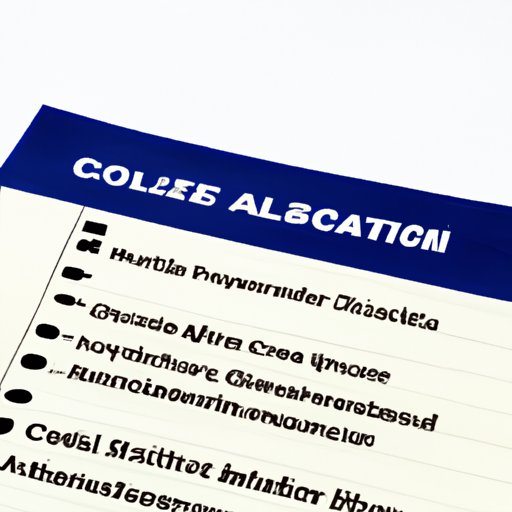
How to Apply for Citizenship: A Comprehensive Guide
Applying for citizenship can be a daunting task, but it is an important step in building a permanent life in a new country. Once you become a citizen, you will have the right to vote, hold public office, travel freely, and receive protection from the government. In this article, we will guide you through the process of applying for citizenship, explain common mistakes to avoid, provide tips on how to prepare for the interview, and give guidance on what is required to pass the English and Civics tests.
Step-by-Step Guide
The citizenship application process requires a series of steps that must be followed precisely. The first step is determining your eligibility, which includes meeting residency and character requirements, and passing a background check. If you are eligible, you must fill out and submit an application form, followed by an interview with a USCIS officer. The final step is passing the English and Civics tests.
Once your eligibility is confirmed, you must fill out the N-400 form, which includes biographical information, work history, travel history, and supporting documentation. The application also requires proof of residency and payment of the application fee.
The interview is an important part of the application process, and failure to prepare can lead to mistakes. To prepare for the interview, applicants should review their application form, practice their English, and study for the Civics test.
The English test is designed to assess your ability to read, write, and speak English, while the Civics test assesses your knowledge of US history and government. Questions on the Civics test range from the name of the President, to the number of members in Congress, and important historical events.
Common Mistakes to Avoid
Applicants for citizenship often make common mistakes that can lead to delays or denial of their application. One of the most common mistakes is failing to provideaccurate information on the application form. Applicants should double-check all information before submitting the form, including dates, names, and identification numbers.
Another common mistake is failing to disclose all criminal history. Even minor offenses should be disclosed, as failure to do so can be considered fraud and lead to denial of citizenship.
Preparing for the interview is crucial in avoiding mistakes. Applicants should read over their application and prepare for interview questions in advance. They should also dress appropriately and arrive on time.
Qualification Requirements
To qualify for citizenship, applicants must meet residency and character requirements. These include being a permanent resident for at least 5 years, being able to demonstrate good moral character, and passing a background check.
Spouses of US citizens are eligible for expedited citizenship after only 3 years of permanent residency. Military personnel and their families, as well as those with certain disabilities, may also be eligible for exemptions and waivers.
Interview Tips
To prepare for the interview, applicants should review their application materials, study for the Civics test, and practice their English. They should dress appropriately and arrive at the designated time and place.
During the interview, the USCIS officer will review the application, ask questions about the applicant’s background, and administer the English and Civics tests. Common questions include information already stated on the application, as well as questions about the applicant’s history and intentions.
English and Civics Test Preparation
Preparing for the English and Civics tests is an essential part of the citizenship application process. Applicants should study English grammar, vocabulary, and pronunciation. The Civics test has 100 questions, and applicants must answer at least 60 correctly to pass. Practice tests and study materials are available online.
Dual Citizenship
Dual citizenship is the concept of being a citizen of two countries simultaneously. To obtain dual citizenship, an applicant must meet the requirements of both countries. The benefits of dual citizenship include the ability to travel more freely, work in both countries, and vote in both countries’ elections. The drawbacks include the potential for double taxation, and military service obligations in both countries.
Conclusion
Applying for citizenship is an important step in building a permanent life in a new country. It requires careful preparation, attention to detail, and a commitment to meeting eligibility requirements. By following the steps outlined in this guide, and avoiding common mistakes, you can increase your chances of a successful outcome. If you are eligible, we encourage you to take the necessary steps towards citizenship and enjoy the benefits of belonging to a great nation.





